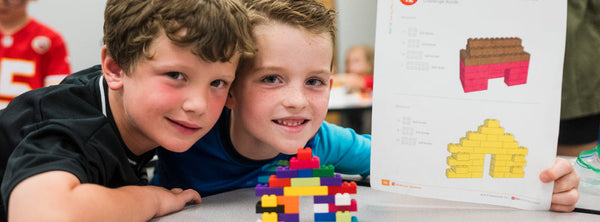
Combat the "Summer Slide" through STEAM Enrichment
Say Goodbye to Summer Learning Loss with Exciting STEAM Camps!
Summer break is on the horizon, and while kids are dreaming of fun in the sun, educators and parents often think about the "summer slide," that sneaky dip in academic progress. But what if we could flip the script and make summer a time of discovery and growth?
Enter STEAM enrichment camps—your secret weapon for keeping young minds engaged and learning, all while having a blast!
Say “goodbye” to summer learning loss and “hello” to summer learning gains, while your learners build new vocabulary, master new skills and explore the world through science, technology, engineering, arts and math.
Why STEAM Camps are a Game-Changer for Summer Learning
Forget boring worksheets! Hands-on activities for kids make learning feel like an adventure. When kids are actively involved and having fun, they're more likely to remember what they learn. Think about the amazing skills they develop: problem-solving, critical-thinking, creativity and collaboration—all 21st Century Skills. And the best part? STEAM naturally blends multiple subjects, holistically reinforcing learning. Read 5 Ways STEM Connects to Holistic Learning for more ideas on how to connect STEM holistically in your curriculum.
PCS Edventures curriculum is built to align with national standards, including Next Generation Science Standards (NGSS), Common Core State Standards (CCSS) for Math and ELA and ISTE Standards for technology. This alignment makes it easy for camp and district administrators to identify and target specific learning gaps. Whether your goal is to reinforce foundational math skills, improve scientific reasoning or boost reading comprehension through integrated writing tasks, our programs provide support to help learners progress without sacrificing fun or creativity.
Ready to harness the power of STEAM? Here are some easy-to-implement ideas:
🧪 Science: Foster Curiosity and Critical Thinking
Boost science skills this summer with hands-on experiments and inquiry-based learning to spark curiosity while reinforcing key concepts like observation, prediction and analysis.
📌 Tips to Inspire Young Scientists this Summer:
- Nature Detectives: Lead local explorations. Learners observe plants, animals and ecosystems, collecting simple data, tallying their findings and discussing life cycles.
- Cool Experiments: Dive into classics like sink-or-float tests, baking soda volcanoes or the water cycle in action.
- Community Connections: Partner with science museums or nature centers for visits or on-site excitement.
- Local Impact: Explore your local ecosystem. What challenges can kids tackle that hit home?
📖 ELA Meets Science:
Supercharge science with language arts integration. It’s a win-win for learning!
Boost ELA Skills through Science:
✏️ Science Journaling and Creative Writing: Document observations in a science journal or write a fictional story based on a scientific concept.
✏️ Research and Presentation: Research a camp-themed topic and present findings, boosting collaboration and public speaking.
✏️ Storyboarding Science: Craft visual stories to explain concepts, then present them.
Here’s how a few of our favorite science-focused programs integrate ELA:

In Dirt Camp, learners write a “Dirtflection” to reflect on a prompt related to the day’s activities.
Embracing ELA integration unlocks the full potential of science activities and maximizes learning. Now, let’s shift gears to technology and see how it sparks innovation!
💻 Technology: Build Digital Fluency
Hands-on tech activities turn kids into innovators, blending excitement with skills like coding, collaboration and digital literacy.
📌Tips to Inspire Young Tech Wizards this Summer:
- Coding Made Fun: Introduce kids to coding with visual tools like Scratch or kid-friendly apps—simple drag-and-drop interfaces spark creativity and logic, no experience needed!
- Robotics in Action: Get gears turning with robotics kits! Kids build, program and tweak their creations, mastering teamwork and problem-solving in a high-tech playground.
- Digital Storytelling: Transform learners into filmmakers: planning, shooting and editing short videos or podcasts about their discoveries. These projects blend tech skills with storytelling flair.
- Community Tech Twist: Partner with local libraries or tech clubs for workshops, or explore real-world tech challenges in your area, like designing apps for local needs.
📖 ELA Meets Tech
Integrate language arts with tech to boost communication and critical thinking—double the impact, twice the fun!
Boost ELA Skills through Technology:
✏️ Act It Out: Bring life to coding by acting out coding blocks in real-time. Learners become the sprite and act out commands to connect actions to coding blocks.
✏️ Chart Reflections: Track learning journeys using a Plus/Delta chart: jotting down wins in the “Plus +” column and ideas for improvement in the “Delta (Δ)” column. This reflection builds a growth mindset through positive insights.
✏️ Scriptwriting and Video Projects: Learners write scripts for their digital stories, sharpening narrative skills.
Here’s how a few of our favorite tech-focused programs integrate ELA:
By weaving ELA into tech, you create a powerhouse of learning that’s as engaging as it is educational. Next up, let’s build some engineering excitement!
🛠️ Engineering: Develop Problem Solvers
Hands-on engineering projects transform learners into builders and problem-solvers, blending fun with skills like design, analysis and perseverance.
📌 Tips to Inspire Young Engineers this Summer:
- Structural Design Challenges: Challenge kids with fun summer engineering projects! Can they build a strong bridge with limited supplies? Design a way to clean water? Create a safe landing device for an egg drop?
- Drone Adventures: Explore flight and control with drones! Learners design, program or even race mini-drones, mastering tech and teamwork in the air.
- Bridge Builders: Create sturdy bridges from simple supplies. Think building bricks, popsicle sticks or straws, then test their strength with weights, igniting a passion for real-world engineering.
- Community Connection: Team up with local engineers or emergency planners to explore how structures stand up to your area’s weather challenges.
📖 ELA Meets Engineering
Integrate language arts with engineering to boost communication and reflection, doubling the learning, maximizing the fun!
Boost ELA Skills through Engineering:
✏️ Read-Alouds: Bring problem-solving strategies to life and inspire innovative designs through stories.
✏️ Creative Writing: Spark creative thinking and critical observation skills through imagination and story-telling. How would the engineer describe their design?
✏️ Circle Maps: Brainstorm and organize information in new ways. Try circle maps, Venn diagrams and charts.
Here’s how a few of our favorite engineering-focused programs integrate ELA:

In BrickLAB Famous Architecture, every lesson includes an ELA extension including poetry and creative writing prompts.

In Ready, Set, Drone!, learners build note-taking skills with interactive notebooks to track learning and new information.
Engineering’s foundation is set. Let’s paint the next section with art!
🎨 Arts: Unlock Creativity and Engagement
Hands-on art projects turn kids into creators, blending joy with skills like innovation, observation and design—all woven into the STEAM framework.
📌 Tips to Inspire Young Artists This Summer:
- Animation and Stop Motion Video: Bring stories to life with simple animation tools or stop motion—crafting mini-movies with clay, paper or toys.
- Cultural Art Exploration: Dive into traditions with projects inspired by global cultures: think Japanese origami, African masks or Indigenous patterns.
- Mosaics and Recycled Art: Create stunning designs using tiles, glass or recycled materials—turning trash into treasure with texture and color.
- Nature-Inspired Artwork: Draw, paint or sculpt using the outdoors as a muse: leaves, rocks and landscapes spark earthy creations.
- Community Creativity: Partner with local museums or artists for hands-on workshops or craft a group mural reflecting your local community.
📖 ELA Meets Art
Integrate language arts with art to boost expression and critical thinking—doubling the learning, maximizing the fun!
Boost ELA Skills through Art:
✏️ Story Sketches: Draw scenes, characters or settings inspired by stories, translating words into visuals to deepen comprehension and creativity.
✏️ Emoji Stories: Challenge learners to write a story using only emojis. Share the stories with a group to see if they can decipher the meaning.
✏️ Character Creation: Kids invent characters for their art, sketching backstories, traits and adventures to bring their creations to life.
Here’s how a few of our favorite art-focused programs integrate ELA:

In World of Wonders, learners explore the world through stories and art projects that deepen cultural awareness.
Art’s creativity is unleashed. Now, let’s count on math to round out STEAM!
➕ Math: Strengthen Foundational Skills
Hands-on math activities turn kids into number ninjas, blending excitement with skills like logic, reasoning and precision.
📌 Tips to Inspire Young Mathematicians:
- Real-life Math: Use real-life situations to explore math! Calculate distances on nature walks, measure ingredients for a science experiment, tally game results or analyze the data they collect.
- Games: Bring out the games and puzzles! These are fantastic for boosting logic, problem-solving and spatial skills, all important parts of summer math programs.
- Math Art: Explore the cool math behind art and design, like symmetry, ratios and shapes. It's amazing how it all connects!
📖 ELA Meets Math
Encourage students to explain their problem-solving process through writing or peer-to-peer presentations.
Boost ELA Skills through Math:
✏️ Charades: Develop deep vocabulary connections through playing charades.
✏️ Journals: Document math discoveries in journals: recording strategies, sketching diagrams or reflecting on problem-solving wins.
✏️ Bubble Maps: Brainstorming and connecting ideas becomes easy when using strategies such as bubble maps, enhancing organization and reasoning skills.
Here’s how a few of our favorite math-focused programs integrate ELA:

In Traveling Artist, daily ELA extensions allow learners to journal the way through their “travels.”

In Drone Designers, learners map out their ideas in their Design Notebooks before creating their drone costumes.
With math in the mix, we’ve covered all of STEAM. Let’s tie it all together!
Why Choose Our STEAM Curriculum?
Our STEAM programs are designed with both engagement and outcomes in mind, empowering administrators to support academic growth through joyful, hands-on learning.
✅ Standards-Aligned to NGSS, ISTE and Common Core
✅ Easy to Implement with Ready-to-Go Materials
✅ Supports Targeted Skill-Building
✅ Ideal for Classrooms, Summer Camps, After-School Programs and Enrichment Clubs
How do you combat the “summer slide?”
Tell us in the comments below.

Author: Carolyn Gilberti
With over ten years experience teaching art and library, Carolyn champions hands-on, project-based learning. Her passion lies in fusing art, technology and science to create powerful connections for learners.


















